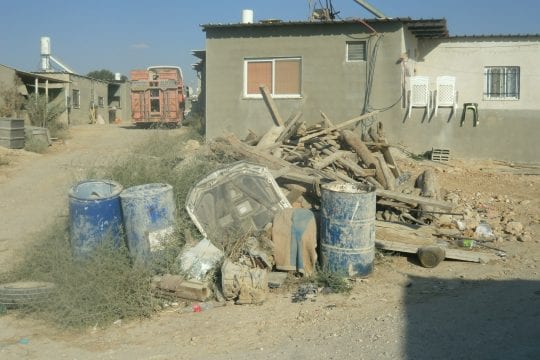
Negev Coexistence Forum for Civil Equality
פורום דו-קיום בנגב לשוויון אזרחי
منتدى التعايش السلمي في النقب من أجل المساواة المدنية
The Government postponed the motion to vote the recognition of three Bedouin villages: ʿAbdih, Rakhamah, and Khašim Zannih
24.12.2020
On Tuesday 22nd of December, the Government postponed the motion to vote the resolution to establish three Bedouin villages and that are still unrecognized: ʿAbdih, Rakhamah, and Khašim Zannih. This delay was due to the opposition of most of the right-wing ministers and their demand to vote the establishment of a young Jewish settlement in the occupied territories of the West Bank, as the main priority of national interest.
The Ministers that disagreed on the recognition of the Bedouin villages, argued that the regulation of a young Jewish settlement on the West Bank that they had promoted recently, had been blocked by the Blue-and-White party, that did not allow it to be included into the government agenda. They upheld that a government that approved the regulation of Bedouin villages in the Naqab and does not approve the regulation of a young settlement on the occupied territories, is in danger of losing it “right to exist”.
Ministers Zeev Elkin, Tzachi Hanegbi, Yuli Edelstein, David Amsalem, Gila Gamliel, Ofir Akunis, Yoav Galant, Rafi Peretz, Eli Cohen, Miri Regev, and Yaakov Avitan announced that they would oppose the decision, following the rejection of the vote.
The Israeli Industry and Economy Minister, Amir Peretz, who declared his commitment to recognize the three Bedouin villages as well as a non-tribal[1] Bedouin city, in the first discussion of the Parliamentary Commission to improve the situation of the Bedouin population in the South, last October, expressed his outrage at the suspension of the vote: “The postponement of the vote is an irresponsible act by the Likud ministers. Precisely when we have reached agreements with the Bedouin society that renewed its trust, but unfortunately, Prime Minister Netanyahu withdrew his commitment to pass the decision and asked for an extension to reach agreements”.
NCF has monitored the circulation of two drafts of the decision of recognition, among ministries. The main identified differences between the first and the second draft were:
– the requirement to concentrate 80% of the population that live on that space (contrary to the internal negotiations that the urban planning staff from Bimkom facilitated).
– involving enforcement forces in the process of recognition, like the Green Patrol.
– the requirement to reduce the borders of the recognized villages.
– a timeline that defines mandatory conditions for recognition, i.e.: if the residents do not move to the new territory within the next five years the decision will be cancelled; if there is no agreement between the residents to move within the next 60 days of the approval, the decision will be cancelled.
NCF repudiates these governmental maneuvers based merely on political interests, rather than on the benefit of its residents, who unfairly continue to experience lack of water resources, electricity, paved roads and basic services, to carry out a dignified life. The decision of non-recognition of the Bedouin villages is evidently intertwined with the next round of upcoming elections in Israel and the inability of the government to reach an agreement. Furthermore, we fail to identify any valid connection between the recognition of the unrecognized Arab Bedouin villages in the Naqab and the establishment of a Jewish settlement in the occupied territories, except for the political element of nationality and ethnicity. Those events clearly have two very different historical and political developments and must be approached with due seriousness, instead of constituting political instruments.
We urge the next government to revert its decision of postponing the vote of recognition of the unrecognized villages of ʿAbdih, Rakhamah, and Khašim Zannih and address the issue as a matter of Human Rights, considering that the Arab Bedouin population is one of the most affected by the Covid-19 crisis in terms of health, education and employment.
[1] “Non tribal” referring to villages which are intended to be populated by members of various tribes.
Photo: Qasim Abu Khutti – Khašim Zannih – 20.09.2017


 Youtube
Youtube
 Twitter
Twitter
 Facebook
Facebook